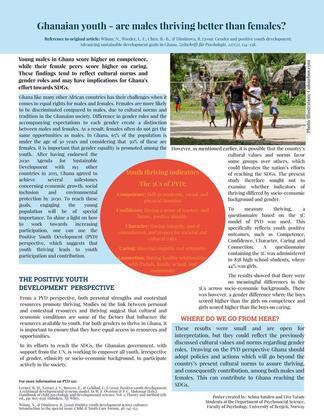Ghanaian youth - are males thriving better than females?
Young males in Ghana score higher on competence, while their female peers score higher on caring. These findings tend to reflect cultural norms and gender roles and may have implications for Ghana's effort towards SDGs.
Main content
Ghana like many other African countries has their challenges when it comes to equal rights for males and females. Females are more likely to be discriminated compared to males, due to cultural norms and tradition in the Ghanaian society. Difference in gender roles and the accompanying expectations to each gender create a distinction between males and females. As a result, females often do not get the same opportunities as males. In Ghana, 65% of the population is under the age of 30 years and considering that 50% of these are females, it is important that gender equality is promoted among the youth. After having endorsed the 2030 Agenda for Sustainable Development with 193 other countries in 2015, Ghana agreed to achieve several milestones concerning economic growth, social inclusion and environmental protection by 2030. To reach these goals, engaging the young population will be of special importance. To shine a light on how to work towards increasing participation, one can use the Positive Youth Development (PYD) perspective, which suggests that youth thriving leads to youth participation and contribution.
The Positive Youth Development Perspective
From a PYD perspective, both personal strengths and contextual resources promote thriving. Studies on the link between personal and contextual resources and thriving suggest that cultural and economic conditions are some of the factors that influence the resources available to youth. For both genders to thrive in Ghana, it is important to ensure that they have equal access to resources and opportunities.
In its efforts to reach the SDGs, the Ghanaian government, with support from the UN, is working to empower all youth, irrespective of gender, ethnicity or socio- economic background, to participate actively in the society.
However, as mentioned earlier, it is possible that the country’s cultural values and norms favor some groups over others, which could threaten the nation’s efforts of reaching the SDGs. The present study therefore sought out to examine whether indicators of thriving differed by socio-economic background and gender.
To measure thriving, a questionnaire based on the 5C model of PYD was used. This specifically reflects youth positive outcomes, such as Competence, Confidence, Character, Caring and Connection. A questionnaire containing the 5Cs was administered to 858 high school students, where 44% was girls.
The results showed that there were no meaningful differences in the 5Cs across socio-economic backgrounds. There was however, a gender difference where the boys scored higher than the girls on competence and girls scored higher than the boys on caring.
Where do we go from here?
These results were small and are open for interpretation, but they could reflect the previously discussed cultural values and norms regarding gender roles. Drawing on the PYD perspective Ghana should adopt policies and actions which will go beyond the country’s present cultural norms to assure thriving, and consequently contribution, among both males and females. This can contribute to Ghana reaching the SDGs.
